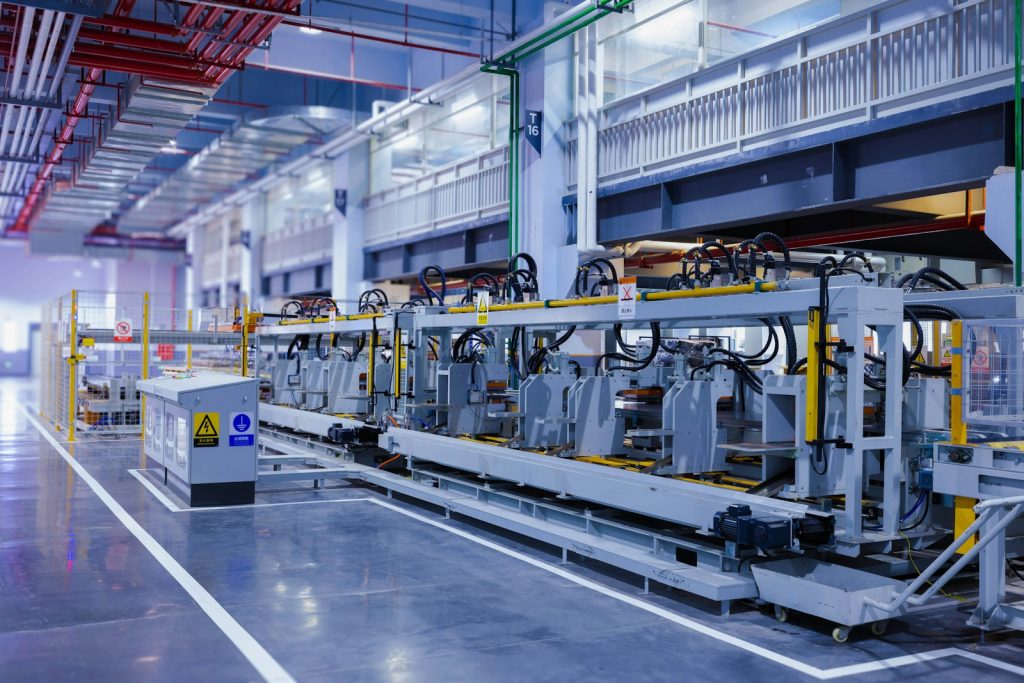The manufacturing industry faces a unique set of challenges in safeguarding against fraud, and one critical area of vulnerability is identity-related fraud.
A robust identity verification system can be the key to protecting your company’s assets, reputation, and workforce integrity.
But is your manufacturing business truly protected?
We explore the importance of identity verification in manufacturing and why proactive measures are essential for keeping your business secure?
The Importance of Identity Security in Manufacturing
Identity verification is increasingly essential in manufacturing, an industry that often relies on diverse workforces, including but not limited to:
- Contractors
- Remote teams
- Seasonal hires
Due to the rapid turnover and the need for trustworthy personnel, manufacturers are particularly vulnerable to identity fraud.
Identity-related fraud can impact your business operations, compromise sensitive data, and even lead to severe financial losses.
Ensuring that your employees, contractors, and partners are who they claim to be isn’t just beneficial; it’s vital to protecting the entire operation.
Effective identity verification can prevent unauthorized access, strengthen internal security.
It also ensures that your workforce is composed of reliable individuals who align with your company’s values and standards.
Identity-Related Fraud in Manufacturing
Identity fraud in the manufacturing sector can take many forms, and each poses distinct risks.
Manufacturers are vulnerable to several types of identity fraud. Some individuals use entirely fabricated identities, while others assume the identities of real people to access facilities or gain employment.
Fraudulent credentials, fake certifications, and falsified employment histories are also common tactics that can deceive employers.
Why Manufacturing is Vulnerable to Identity Fraud?
With high turnover rates, diverse hiring needs, and limited central oversight, manufacturing businesses are prime targets for identity-related fraud.
Hiring contract workers or seasonal employees without thorough verification can open the door to fraudsters.
This vulnerability is compounded when operations are spread across multiple locations, making it challenging to maintain consistent verification standards.
Potential Consequences of Identity Fraud in Manufacturing
Identity-related fraud can lead to significant financial, legal, and operational repercussions.
Fraudulent employees may gain access to your sensitive intellectual property, compromise data security, or even sabotage your production processes.
You could also face reputational damage, as customers and partners lose trust in your ability to maintain a secure and credible workforce.
How Identity Verification Helps To Protect Your Business?
Identity verification provides manufacturing businesses with a robust defense against fraud and unauthorized access. Here’s how it works to secure your operations:
Verification of Credentials and Certifications
Confirming the legitimacy of employees’ credentials is crucial, especially for specialized roles.
Verifying certifications ensures that only qualified personnel are entrusted with critical responsibilities.
Unqualified staff can pose risks to safety and product quality, ultimately affecting your bottom line.
Screening for Criminal Backgrounds and Red Flags
Screening for criminal records is essential to prevent potential threats.
Some roles may require employees to handle sensitive information or operate dangerous machinery, making it crucial to avoid individuals with histories of violence, theft, or other criminal behavior.
Ensuring Compliance with Industry Standards and Regulations
Compliance with industry standards is a non-negotiable aspect of modern manufacturing.
Identity verification helps ensure you meet legal and regulatory requirements, which reduces the risk of penalties and reinforces your commitment to ethical business practices.
Reducing Internal Threats
Identity verification mitigates internal risks by ensuring that only vetted individuals have access to restricted areas or data.
This proactive step minimizes the likelihood of data theft, sabotage, or intellectual property breaches from within your organization.
Key Benefits of Identity Verification in the Manufacturing Sector
Identity verification offers a range of benefits that extend beyond security.
It strengthens your overall operations, boosts trust within the organization, and improves regulatory compliance.
Strengthens Security and Reducing Fraud Risks
Identity verification acts as a gatekeeper, reducing the risk of fraud by allowing only legitimate employees to access your facilities.
This approach minimizes the chance of fraudulent actors slipping through and gaining access to sensitive information or equipment.
Builds Trust and Accountability
When employees know that their colleagues have been thoroughly vetted, they feel safer and more secure.
Identity verification reinforces a culture of accountability, as all employees are aware of the standards upheld by your organization.
Enhances Productivity and Operational Efficiency
Identity-related fraud can disrupt operations, delay projects, and increase costs.
By ensuring the legitimacy of your workforce from the start, you avoid costly investigations and re-hiring efforts, ultimately improving productivity.
Minimizes Regulatory and Legal Risks
Compliance with legal standards around identity verification reduces your exposure to fines and legal issues.
It also demonstrates your company’s commitment to following ethical practices, which can be critical when attracting partners and investors.
Protects Intellectual Property and Confidential Data
Your manufacturing processes and trade secrets are valuable assets.
Identity verification prevents unauthorized individuals from accessing proprietary information, ensuring that your intellectual property remains secure and protected from theft.
Safeguards Workplace Safety
Identity verification can help identify individuals with a history of unsafe practices or violent behavior.
This reduces the likelihood of accidents and ensures that your workplace is a safe environment for all employees.
Reduces Costs Associated with Fraud and Re-Hiring
Fraud investigations and re-hiring can be costly and time-consuming.
Identity verification minimizes these expenses by reducing the risk of hiring fraudulent employees who may later need to be replaced.
Improves Business Reputation
A reputation for rigorous hiring and security practices can set your company apart.
Identity verification demonstrates your commitment to protecting both employees and assets, strengthening your credibility and trustworthiness in the industry.
Risks and Challenges of Implementing Identity Verification
Despite its benefits, implementing identity verification in manufacturing comes with certain challenges.
Understanding these challenges is crucial for developing an effective verification process.
Privacy and Data Protection Concerns
Collecting and storing employee data can raise privacy issues, especially if the data is mishandled.
You must ensure that personal information is protected and only used for legitimate purposes, which is essential to avoid data breaches and privacy violations.
Initial Implementation Costs
Implementing identity verification requires upfront investment in technology, training, and processes.
While the initial costs may seem prohibitive, the long-term benefits often outweigh these initial expenses.
Employee Resistance
Some of your employees may view identity checks as invasive or distrustful.
To address this, it’s essential to communicate the benefits and assure them that verification is in place to protect everyone in the organization.
Difficulty in Verifying Overseas or Seasonal Workers
If you hire international or temporary workers, identity verification can be complex.
Verification processes must be tailored to accommodate different regulations and verification sources across borders, which requires a nuanced approach.
Technology Dependency and System Vulnerabilities
Identity verification systems rely on technology, making them susceptible to cyber-attacks.
Cybersecurity measures must be integrated to protect verification processes from potential threats.
Risk of False Positives and False Negatives
Errors in verification can lead to mistakenly flagged candidates or missed red flags. Balancing strict verification standards with efficient hiring processes is essential to avoid costly hiring delays.
Time Constraints and Hiring Delays
Identity verification can be time-consuming, potentially delaying hiring processes. Streamlining your verification system is important to avoid bottlenecks, especially when filling critical positions quickly.
Need for Continuous Monitoring and Updates
Identity verification isn’t a one-time effort; it requires ongoing updates
Regularly revisiting and updating employee data ensures that any new risks are identified and managed in a timely manner.
Best Practices for Effective Identity Verification in Manufacturing
Implementing identity verification effectively in manufacturing requires a strategic approach that combines the right tools, policies, and support.
Partner with a Reliable Background Verification Company
Given the complexity of identity verification, partnering with an experienced background verification company can provide significant support.
Such companies have the expertise and technology to manage identity verification in compliance with regulations, making the process smoother and more reliable.
Utilize Multi-Factor Authentication and Digital ID Verification
Multi-factor authentication adds a layer of security by requiring multiple verification steps, which enhances identity confirmation.
Digital ID verification can further assist in remote and offsite employee verification, providing flexibility without compromising security.
Integrate Verification into Your Onboarding Process
Incorporating identity verification into your standard onboarding procedures reinforces its importance as part of your company culture.
This approach ensures that every new hire is vetted before accessing your facilities or systems.
Conduct Periodic Re-Verification for Existing Employees
Regularly re-verifying existing employees helps you stay ahead of potential risks, ensuring that your workforce remains reliable and compliant.
Periodic re-verification can help you maintain updated records and identify any new red flags as they arise.
Future Trends in Identity Verification for Manufacturing
Identity verification technology is constantly evolving, and staying informed on these trends can help you maintain a competitive edge in fraud prevention.
AI and Machine Learning in Identity Verification
Artificial intelligence and machine learning are transforming identity verification by automating data analysis, detecting patterns, and flagging suspicious behaviors.
AI-based tools can improve verification accuracy, speed up the process, and adapt to emerging fraud tactics.
Blockchain Technology for Secure Identity Verification
Blockchain offers a decentralized, secure method for storing and verifying identity data.
By leveraging blockchain, you can enhance data protection, minimize breaches, and maintain a reliable identity verification system.
Biometric Verification and Its Growing Role
Biometric verification, such as fingerprint and facial recognition, is becoming more prevalent in manufacturing.
Biometrics provides you a highly secure way to confirm identity, especially in high-security zones where traditional methods may fall short.
Increased Focus on Global Compliance
As data privacy and international regulations become stricter, compliance in identity verification will be critical.
Adhering to global standards can help you avoid penalties and ensure smooth cross-border operations, especially if you have international facilities or employees.
Conclusion
Identity verification is essential for any manufacturing business that values security, efficiency, and trustworthiness.
By implementing thorough identity verification, you protect your business from fraud, ensure compliance with regulations, and build a safe, productive environment for your workforce.
Identity verification goes beyond simply confirming identities; it secures your company’s future by creating a reliable, well-vetted workforce that aligns with your organization’s standards.
Consider partnering with a specialized background verification company to streamline the identity verification process and stay compliant with the latest regulations.
Collaborate with AMS Inform for Effective Identity Verification Solutions
Navigating the complexities of Identity Verification requires specialized expertise, which is why many organizations choose AMS Inform as their trusted partner.
Since our founding in 1986, AMS Inform has accumulated over 38 years of experience in background verification, providing services that support secure and compliant hiring processes.
Our comprehensive range of services includes digital and identity verification, educational checks, and both pre- and post-employment screenings.
We also offer credit checks, health and drug screenings, insurance claims investigations, and language translation services to meet the diverse needs of our clients.
With operations spanning over 160 countries and local teams in 16, partnering with AMS Inform ensures that your global operations are fully supported while maintaining compliance with applicable regulations.
As proud members of NASSCOM and PBSA, we are committed to safeguarding the reputation and integrity of your business.
For tailored solutions to meet your Identity Verification needs, reach out to our team today.


















